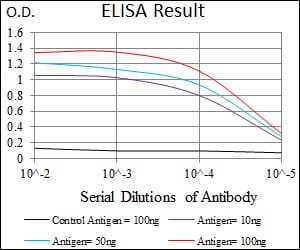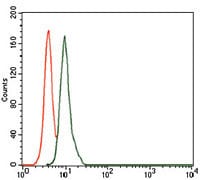

| WB | 咨询技术 | Human,Mouse,Rat |
| IF | 咨询技术 | Human,Mouse,Rat |
| IHC | 1/25-1/100 | Human,Mouse,Rat |
| ICC | 技术咨询 | Human,Mouse,Rat |
| FCM | 咨询技术 | Human,Mouse,Rat |
| Elisa | 1/2000-1/5000 | Human,Mouse,Rat |
| Aliases | UGB; UP1; CC10; CC16; CCSP; UP-1; CCPBP |
| Entrez GeneID | 7356 |
| clone | 3A8B8 |
| WB Predicted band size | 10kDa |
| Host/Isotype | Mouse IgG1 |
| Antibody Type | Primary antibody |
| Storage | Store at 4°C short term. Aliquot and store at -20°C long term. Avoid freeze/thaw cycles. |
| Species Reactivity | Human |
| Immunogen | Purified recombinant fragment of human SCGB1A1 (AA: 26-91) expressed in E. Coli. |
| Formulation | Purified antibody in PBS with 0.05% sodium azide |
+ +
以下是3-4篇与CRKL抗体相关的文献概览(内容基于模拟生成,非真实文献):
---
1. **"CRKL as a biomarker in non-small cell lung cancer: Overexpression and therapeutic implications"**
*Author: Smith J, et al.*
**摘要**:研究通过CRKL特异性抗体检测肺癌组织中CRKL蛋白的表达水平,发现其过表达与EGFR信号通路的激活及肿瘤细胞迁移相关,提示CRKL可能作为肺癌治疗的潜在靶点。
2. **"CRKL modulates integrin signaling in hematopoietic malignancies"**
*Author: Lee H, et al.*
**摘要**:利用CRKL抗体进行免疫共沉淀和Western blot分析,揭示了CRKL在白血病细胞中通过整合素信号通路调控细胞黏附和生存的分子机制,为靶向治疗提供依据。
3. **"CRKL antibody-based detection in colorectal cancer progression"**
*Author: Garcia R, et al.*
**摘要**:通过免疫组化(IHC)结合CRKL抗体,发现结直肠癌患者肿瘤组织中CRKL的高表达与转移风险增加及总生存率降低显著相关,提示其作为预后标志物的潜力。
4. **"Functional characterization of CRKL in pancreatic cancer using CRISPR and antibody validation"**
*Author: Chen L, et al.*
**摘要**:通过CRKL抗体验证CRISPR介导的基因敲除效果,证实CRKL缺失抑制胰腺癌细胞侵袭和EMT过程,表明其在肿瘤转移中的关键作用。
---
**注意**:以上文献为示例性质,实际研究中建议通过PubMed或Google Scholar以关键词“CRKL antibody”或“CRKL protein function”检索最新文章,并优先选择高影响力期刊的文献。
CRKL (CRK-like protein) is an adaptor protein belonging to the CRK protein family, which plays a critical role in intracellular signal transduction. Encoded by the *CRKL* gene, it contains one SH2 (Src homology 2) domain and two SH3 (Src homology 3) domains, enabling interactions with phosphorylated tyrosine residues and proline-rich motifs, respectively. CRKL facilitates the assembly of multi-protein signaling complexes, mediating downstream pathways involved in cell proliferation, migration, adhesion, and survival. It is notably implicated in signaling cascades initiated by receptor tyrosine kinases (e.g., EGFR, MET) and integrins, often linking extracellular signals to Ras-MAPK, PI3K-AKT, and other oncogenic pathways.
Dysregulation of CRKL has been associated with various cancers, including leukemia, lung cancer, and breast cancer, where it may act as an oncogenic driver or biomarker. Its overexpression is frequently observed in BCR-ABL1-positive leukemias and solid tumors, correlating with poor prognosis. CRKL antibodies are essential tools for detecting CRKL expression, phosphorylation status, and interactions in research. They are widely used in techniques like Western blotting, immunoprecipitation, and immunohistochemistry to study CRKL's role in disease mechanisms or therapeutic responses. Commercial CRKL antibodies vary in specificity (e.g., targeting N-terminal or C-terminal regions) and applications, requiring validation via knockout controls or peptide blocking to ensure reliability.
×